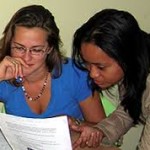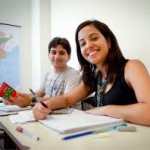Sofia Vergara is another Hispanic actress, TV presenter and model who has successfully crossed over into  the English-speaking market. Her full name, according to the usual Spanish naming convention, is Sofía Margarita Vergara Vergara and she was born in Colombia on July 10 1972.
the English-speaking market. Her full name, according to the usual Spanish naming convention, is Sofía Margarita Vergara Vergara and she was born in Colombia on July 10 1972.
Her television career began on Spanish-language network Univisión back in the 1990s where she became very well known for presenting two popular shows. She made her move into English-speaking movies in the 2003 film Chasing Papi and subsequently went on to roles in many other films, among them The Smurfs, Happy Feet Two and Hot Pursuit. However, it is her television acting for which she is best known, playing Gloria Delgado-Pritchett in the hugely successful series Modern Family. The role has won her multiple award nominations and seen her named top-earning actress on US television two years running, in 2012 and 2013.
Vergara moved to Miami in 1994 to escape unrest in her native Colombia, where one of her brothers was murdered. She was naturalised in 2014 after achieving a score of 100% on her citizenship test. Her story is testament to the fact that anyone can adjust to a new country and language, but even if you don’t plan to move to a Spanish-speaking country, acquiring the language is very useful both for business and pleasure. If you are thinking of taking it up, our Spanish lessons in London are the ideal starting point.
 fewer who are more successful or better known than Colombian singer-songwriter Shakira, full name Shakira Isabel Mebarak Ripol, who was born in Barranquilla on 2 February 1977.
fewer who are more successful or better known than Colombian singer-songwriter Shakira, full name Shakira Isabel Mebarak Ripol, who was born in Barranquilla on 2 February 1977. speaking countries but have also achieved phenomenal success in the English-speaking world. We start with actress, director and producer Salma Hayek who was born Salma Hayek Jiménez in Veracruz, Mexico on 2 September 1966 and educated in Louisiana, USA from the age of twelve.
speaking countries but have also achieved phenomenal success in the English-speaking world. We start with actress, director and producer Salma Hayek who was born Salma Hayek Jiménez in Veracruz, Mexico on 2 September 1966 and educated in Louisiana, USA from the age of twelve. many different ways of learning a language, and many different types of student with their own learning styles. For a great many people, their word ‘lesson’ is synonymous with being in a classroom with a group of other students; they feel comfortable in this traditional setting and they may decide to enrol on a Spanish course at their local night school. While we certainly don’t want to be disparaging about this type of course, they are bound to a great degree by the curriculum which is set for them by their local authority and they are obliged to cater for a wide range of students with different abilities and learning objectives. Classes will go at a pre-determined pace and quicker learners can sometimes feel held back by the slower ones.
many different ways of learning a language, and many different types of student with their own learning styles. For a great many people, their word ‘lesson’ is synonymous with being in a classroom with a group of other students; they feel comfortable in this traditional setting and they may decide to enrol on a Spanish course at their local night school. While we certainly don’t want to be disparaging about this type of course, they are bound to a great degree by the curriculum which is set for them by their local authority and they are obliged to cater for a wide range of students with different abilities and learning objectives. Classes will go at a pre-determined pace and quicker learners can sometimes feel held back by the slower ones. probably occurred to you at one time or another how much easier it would be if you could pick it up as easily as you picked up your native language. So why don’t we?
probably occurred to you at one time or another how much easier it would be if you could pick it up as easily as you picked up your native language. So why don’t we?
 occupation requires them to do business internationally; for others it is purely a question of taking pleasure in learning, but most people embark on a language course because they already have an interest in the country in which the language is spoken, and its culture. Those attending our
occupation requires them to do business internationally; for others it is purely a question of taking pleasure in learning, but most people embark on a language course because they already have an interest in the country in which the language is spoken, and its culture. Those attending our 

